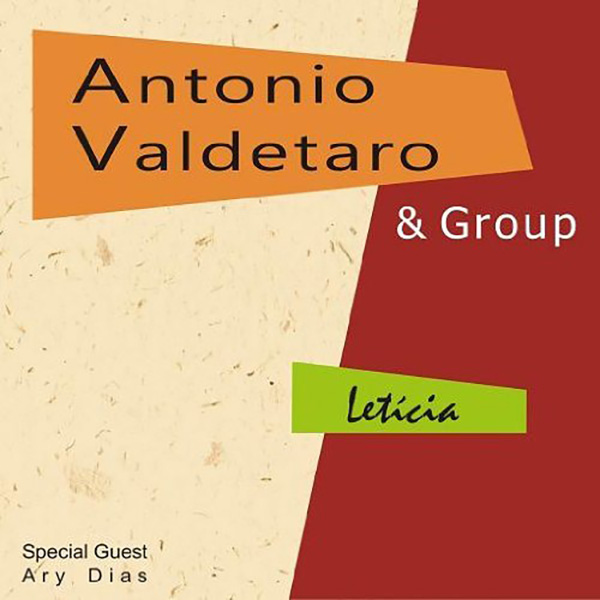
by Ian Mann
November 12, 2009
/ ALBUM
A warm, bright, melodic album. Unmistakably jazz but with an authentic Brazilian flavour
This self released recording by the Brazilian guitarist Antonio Valdetaro has been forwarded to the Jazz Mann office all the way from Sao Paolo. The liner notes may be entirely in Portugese making translation difficult for your monoglot reviewer but music is an international language and there are some fine sounds to be heard on this CD.
Valdetaro was born in the city of Niteroi near Rio De Janeiro but travelled to Europe to study music, firstly in Lisbon and later in Barcelona. He also gigged extensively on the continent before returning to Brazil and settling in Sao Paolo.
Valdetaro’s guitar teachers during his European sojourn included Barney Kessell and Kurt Rosenwinkel. This gives you some idea as to where this record is coming from. Although Valdetaro and his group make use of Brazilian rhythms and styles-samba, bossa, choro etc.- this is primarily a jazz record. For European and American listeners there are parallels with the breezy Brazilian influenced music of Pat Metheny. Valdetaro has a warm, singing tone sometimes reminiscent of Metheny, at other times he sounds more conventionally “jazzy” like his mentor Kessel. This is a warm, bright album, entirely instrumental and unmistakably jazz but with a wholly authentic Brazilian flavour.
Valdetaro deploys a core group of himself on guitar plus Fabio Leandro on piano and keyboards, Roberto Carvalho on electric bass, Jose dos Santos on saxophones and flute and Pepa D’Elia at the drums. Guest appearances come from Rubinho Antunes on trumpet and flugel, Sidiel Vieira on double bass and drummers Adriano Trindade and the late Ary Dias (1944-2008) who sadly died just after this album was completed. All are highly accomplished players who are given frequent opportunities to shine on a programme of nine Valdetaro original compositions.
The album commences with the lively “Segura e Sai”, a spirited opener that introduces Valdetaro’s smooth tone and fluent technique. With his jazzy chording and single note single solo lines it’s immediately obvious that he’s a supremely skilled jazz guitarist. Bassist Carvalho also reveals his credentials as a soloist with a fleeting, liquid solo in his instrument’s higher register and there’s a similarly impressive burst from Leandro at the piano.
“Bossa Louca” features a guest appearance from Trindade at the drums. No prizes for guessing the style here but the melody is languid and memorable with a hint of Metheny about it. Valdetaro’s guitar is warm and conversational and there are also impressive contributions from Carvalho and from dos Santos on sax.
“Concorrencia Desleal” pairs Valdetaro’s guitar with dos Santos’ effervescent flute and soprano sax on a joyous piece subtly propelled by Carvalho’s sinuous bass undertow and D’Elia’s understated but energetic drumming. Excellent.
“Tradicao” incorporates the contribution of the late Ary Dias who provides the pattering backdrop for excellent solos from Valdetaro, Leandro on piano and Dos Santos on saxophone. Dias also gets to enjoy a few drum breaks himself before the track’s close.
The title track features Valdetaro on both acoustic and electric guitars with Sidiel Vieria coming in on acoustic bass. The tone is laid back and conversational, almost ballad like but with a gentle samba rhythm. When dos Santos’ warm sounding saxophone enters the proceedings the listener is reminded of Stan Getz’s excursions into Brazilian music during the samba/bossa boom of the sixties.
Urublues Malandro” is quietly funky but in a uniquely Brazilian way and features solos from Valdetaro, Leandro on electric piano and dos Santos on saxophone.
Deixa Estar” is a coolly languid ballad that features guest performer Rubinho Antunes on velvety flugel horn. Valdetaro makes his now customary eloquent contribution with a couple of tasteful solos.
Antunes switches to trumpet for the more up tempo “Moca Bonita” and produces a fluent, agile solo on the instrument. Carvalho and Leandro display similar qualities on electric bass and piano respectively.
The closing “Cancao da Geraes” is a showcase for guitar and saxophone Valdetaro and dos Santos (on soprano) both delivering expressive solo statements. D’Elia, who is tasteful and sympathetic throughout enjoys a brief solo interlude at the drums.
“Leticia” is a warm, melodic, accessible album with some fine ensemble playing and some distinguished soloing, particularly from Valdetaro itself. Occasionally things can be a little too tasteful and tend towards the bland but there is still plenty to enjoy here. On a cold, dank November day in England Valdetaro’s warm, sunny Brazilian music
blog comments powered by Disqus